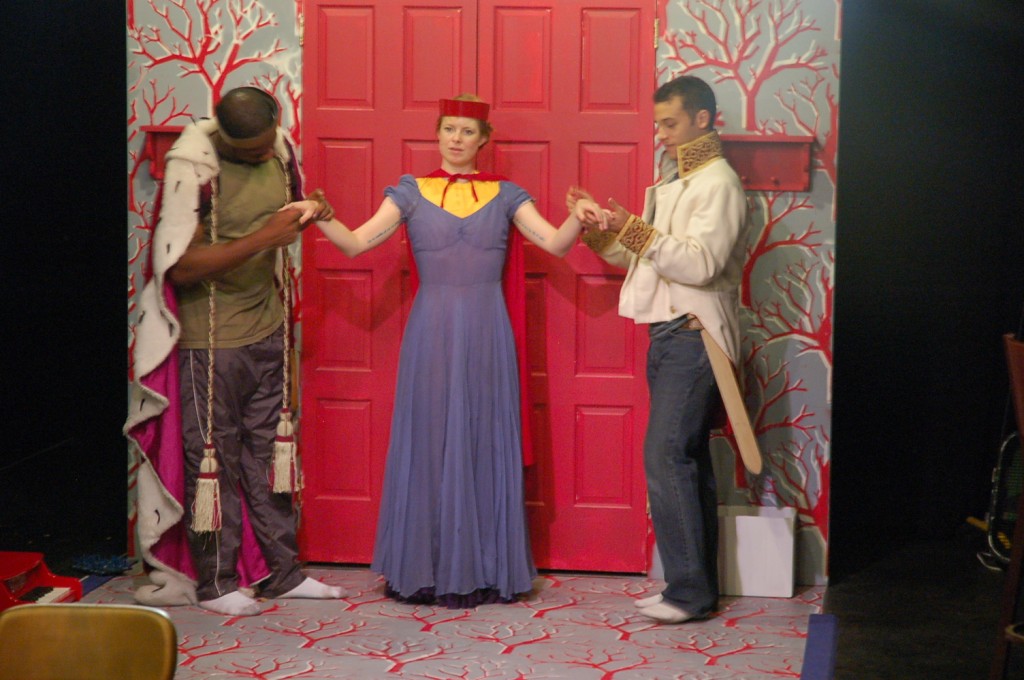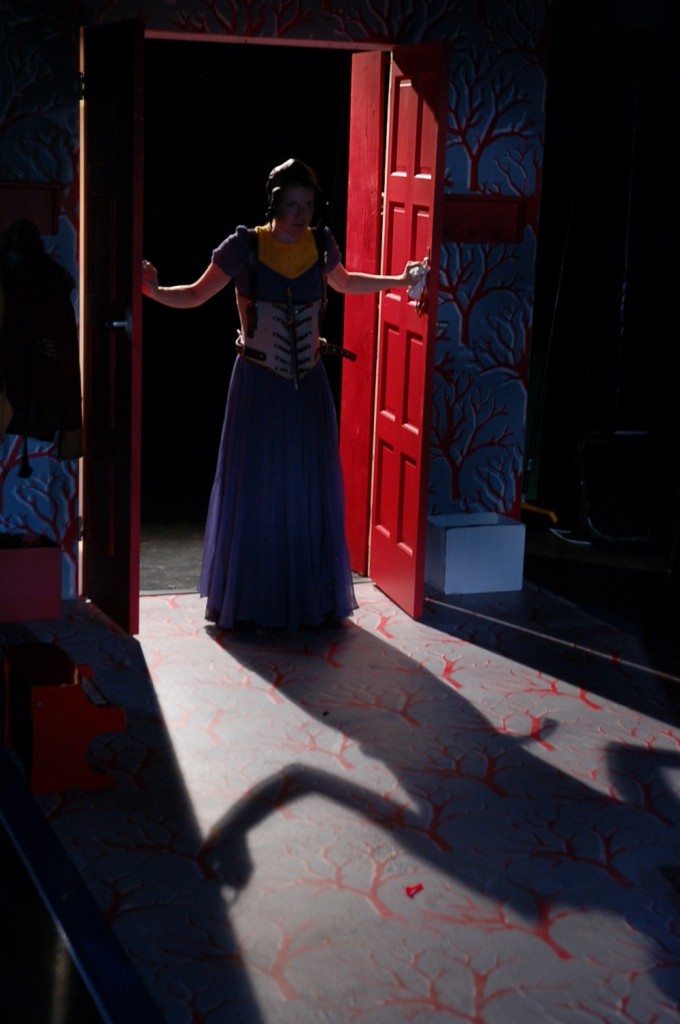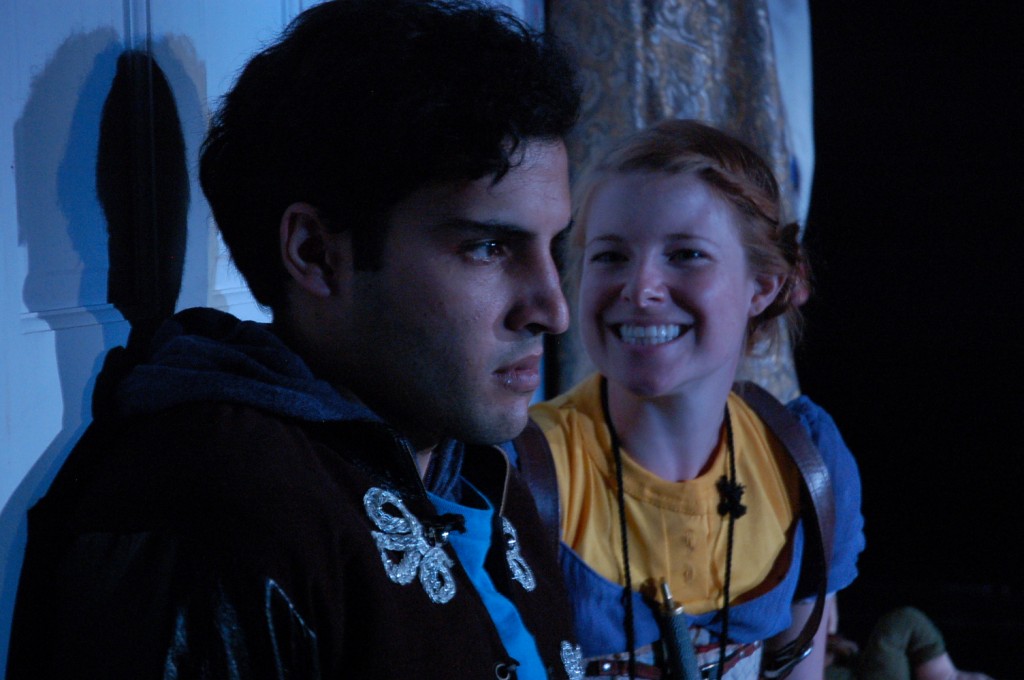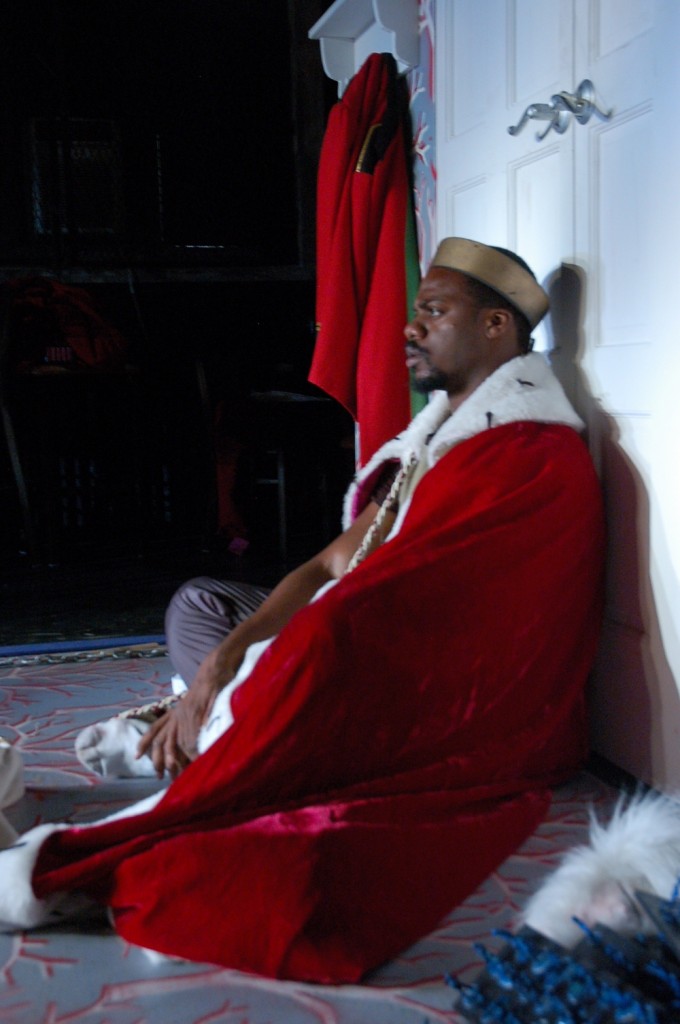
Marcus Henderson, Jillian Taylor and Andrew Z. Kelsey in the Yale Summer Cabaret Shakespeare Festival production of Rose Mark'd Queen. Photo courtesy of Yale Summer Cabaret.
Devin Brain’s Rose Mark’d Queen, a kick-ass kitbashing of half a dozen of Willaim Shakespeare’s history plays, deserves a follow-up report. One of the most impressive aspects of the production—which Brain adapted and directed, while also serving as artistic director of the Yale Summer Cabaret’s whole three-show all-Shakespeare season—is how adroitly its pieces fit together.
It’s not as if Shakespeare was particularly helpful in that regards. These are the bard’s words, spat stirringly by a five-person ensemble. But Brain’s most overt throughline—the character of Queen Margaret, who figures to varying degrees in Henry IV, Henry V, the three-part Henry VI and Richard III—doesn’t line up very cleanly. Nor does the chronology of the plays. Nor do the battles they engage in.
Brain does provide an overarching metaphor of kids playing around a sandbox. The toy weapons get realer as the plays get darker. But even that thematic touch can only get the project so far. That Rose Mark’d Queen remains so riveting from start to finish is a triumph of details, not of big pictures.
Still thoroughly impressed with the show two weeks after seeing it, I sat down with Brain and his Summer Cabaret Associate Artistic Director Elliott Quick to suss out how Rose Mark’d Queen earned it high marks.
The genesis for the show began when Brain was in his second year as a directing student at the Yale School of Drama (from which he graduated this past May). The students are expected to do a “verse project,” usually Shakespeare. He ultimately went with Macbeth for the school project, but not before toying with “these ideas I had for doing cuttings of all the scenes with Margaret. Especially the scenes with [William, Earl of] Suffolk. Those are the only mentions of love in these plays.”
Brain mentions a dainty exchange in Act 5, Scene Henry VI Part I, when Suffolk makes a Freudian slip of personal affection, and Margaret catches it. He’s brokering her marriage to King Henry and says:
I’ll undertake to make thee Henry’s queen,
To put a golden sceptre in thy hand
And set a precious crown upon thy head,
If thou wilt condescend to be my—
MARGARET: What?
SUFFOLK: His love.
MARGARET: I am unworthy to be Henry’s wife.
“So I did start with Margaret,” Brain continues. “I did isolate the major Margaret scenes. But when I looked again, I realized I needed the context of the wars she’s dealing with. In the world Shakespeare was creating, there is this power vacuum”—one in which, Brain explains, even the play’s titular rulers can’t be counted on to be present for major developments. “In Henry VI Part I, we don’t see Henry VI until the end of the first act. I wanted to create something similar to that.
“Then,” he reveals, “I discovered I had to pare down the wars.” There are an awful lot of them, and Brain wanted to be sure that especially revealing or visceral battleground scenes shone through. He’d read an anecdote—“which I think is apocryphal,” he admits—about the real-life Queen Margaret, in which she had helped oversee the recapture of 40 knights of the House of York, then brought out her Henry—then a boy of 12—to order and witness their execution.
“All these character are going through that,” Devin Brain exclaims. It’s how they were raised.”
Elliott Quick, who assisted in the dramaturgy and directing of Rose Mark’d Queen and who, like Devin Brain, leads pre-show “Immersion Series” and post-shos “Talkback” discussions of the production for interested audience members—says that “tracking the violence in these plays is what brought us to the childhood framework.
Brain and Quick chart how, in these vast, corpse-strewn works, “the deaths get increasingly personal.” That may be where Rose Mark’d Queen really gets its shape and propulsive plot. Early in the show, we see Margaret idly standing by while the boys play their war games. Later on, she’s stabbing a guy herself. “It’s rare for a Shakespearean woman to wield a weapon,” Brain and Quick agree. “Not even Lady Macbeth, at least not onstage.”
Quick joined the project early enough to observe the cutting and piecing together of the Shakespeare scripts. A lot of the subsequent shaping of Rose Mark’d Queen was done in rehearsals with the active participation of the cast. “I knew I wanted a tight group—most of the actors were people I’d worked with more than once. And I just liked Jill”—that’s sole female cast member Jillian Taylor, who anchors the show as Margaret. “It was amorphous, how far we were going to go with the idea of children playing. We didn’t want to mock children—we wanted to show that complete belief they have in what they’re doing.”
That belief system extended to having some roles in the epic drama played by dolls. It was decided from the start that Rutland would be a doll. The seductive Lady Grey was originally considered as a random member of the audience until the idea arose of making her a pornographic blow-up doll, an extension of the toy metaphor at a point where the show gets increasingly “adult.”
“Fun toys for any occasion,” Brain jokes. “We conceptualized it with overtheatricality and toys, going from toys to real weapons.” Brain adds that “this production was geared for the Cabaret space.” If he does it again elsewhere, the violence would climb past bloody stabbing and “throttling” to realistic gunfire. Alas, “you can’t fire live rounds in the Cabaret.
The Yale Summer Cabaret Shakespeare Festival repertory format, which had all three shows debuting within weeks of each other, then running jointly for over a month, is a wonderful opportunity for the actors—most of whom were drawn from the Yale School of Drama acting program—to experience a show that can evolve over time. Most School of Drama production have less than a week of performances. School-year Yale Cabaret offering get six performances, but in the space of a single weekend. It’s hard to believe, but the Yale Summer Cabaret only just hit its halfway point on Friday, with another month of performances still to happen. “It’s an opportunity we don’t get as students,” Devin Brain exults. “The actors get more comfortable. All three shows are at a point where they’re deepening.”
To which Elliot Quick adds, “You get to keep it fresh. Keep it alive.”
Even as scores of toy soldiers die.




flower images love